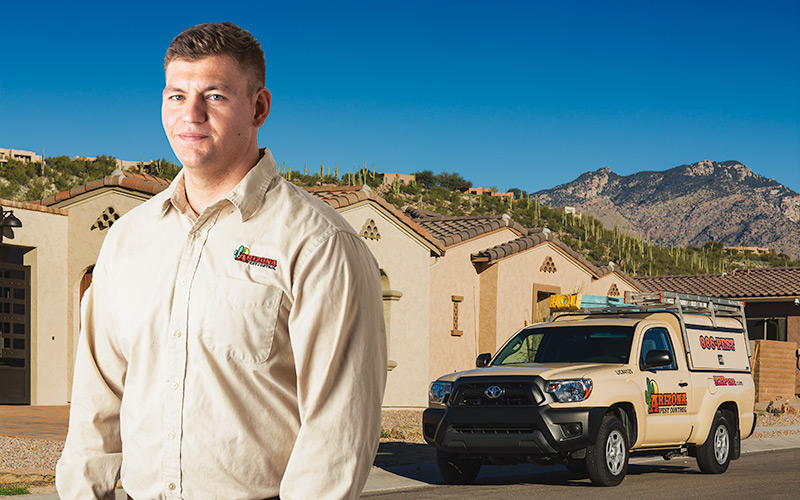Termites cause billions of dollars in property damage across the United States each year, and Tucson homeowners face unique challenges when it comes to these destructive pests. The desert climate and specific construction materials common in Arizona create an environment where certain termite species thrive, making professional intervention often necessary to protect your investment.
Selecting the right termite control partner can mean the difference between effective, long-term protection and costly recurring infestations. With numerous pest control companies operating in the Tucson area, each offering different approaches, pricing structures, and service guarantees, making an informed decision requires careful consideration of multiple factors.
This guide will walk you through the essential criteria for evaluating termite control services in Tucson, helping you identify a partner who can effectively address your specific situation while providing reliable, professional service. From understanding local termite species to evaluating treatment methods and service agreements, you’ll learn what questions to ask and what red flags to avoid.
Understanding Tucson’s Termite Landscape
Tucson’s desert environment hosts several termite species that pose distinct threats to residential properties. Subterranean termites, the most common variety in the area, build extensive underground colonies and access homes through soil contact points. These termites require moisture to survive, often targeting areas where wood meets soil or where plumbing leaks create favorable conditions.
Drywood termites present a different challenge altogether. Unlike their subterranean cousins, drywood termites can establish colonies directly within wooden structures without requiring soil contact. They’re particularly problematic in Tucson because they can survive in the area’s low-humidity environment, making them well-adapted to local conditions.
Understanding which species you’re dealing with influences treatment selection significantly. Subterranean termite treatments often focus on soil applications and barrier creation, while drywood termite elimination may require fumigation or localized wood treatments. A qualified termite control partner should be able to identify the species present and explain how this identification shapes their recommended approach.
Essential Qualifications and Credentials
Professional termite control requires specialized knowledge and proper licensing. In Arizona, pest control operators must hold valid licenses issued by the Arizona Department of Agriculture. These licenses demonstrate that technicians have completed required training and passed examinations covering pest biology, treatment methods, and safety protocols.
Look for companies that maintain active memberships in professional organizations such as the National Pest Management Association or the Arizona Pest Professional Organization. These memberships often indicate a commitment to staying current with industry developments and adhering to professional standards.
Insurance coverage represents another crucial qualification. Reputable termite control companies carry both general liability insurance and errors and omissions coverage. This protection safeguards you in the unlikely event that treatment procedures cause property damage or fail to achieve promised results.
Experience specifically with Tucson-area termite problems provides additional value. Companies that have operated locally for several years understand the unique challenges posed by local soil conditions, construction methods, and termite species. They’re also more likely to have established relationships with local suppliers and be familiar with municipal regulations that might affect treatment options.
Evaluation of Treatment Methods
Modern termite control encompasses several distinct approaches, each with specific advantages and limitations. Liquid barrier treatments involve applying termiticides to soil around a structure’s perimeter, creating a protective zone that termites cannot cross without exposure to the active ingredient. This method works particularly well for subterranean termite prevention and elimination.
Baiting systems take a different approach, using strategically placed monitoring stations containing attractive materials that termites consume and share with colony members. Baiting systems can be highly effective for eliminating entire colonies but typically require longer timeframes to achieve complete control.
Fumigation represents the most comprehensive treatment option for drywood termites. This process involves enclosing the entire structure and introducing gas that penetrates all wood members, eliminating termites throughout the building. While fumigation requires temporary relocation, it provides the most thorough treatment for widespread drywood termite infestations.
Some situations may benefit from localized treatments such as spot applications or heat treatments for confined infestations. A knowledgeable termite control partner should be able to explain why they recommend a particular method for your specific situation and discuss alternatives when multiple options might be viable.
Service Agreement Components
Termite control service agreements vary significantly in their terms and coverage. Understanding these differences helps you make informed comparisons between providers and avoid unexpected costs or limitations.
Treatment warranties represent a critical component of most service agreements. Some companies offer warranties that cover retreatment if termites return within a specified period, while others include repair coverage for new damage that occurs during the warranty period. Understanding exactly what warranty coverage includes and excludes helps you evaluate the true value of different proposals.
Ongoing monitoring and maintenance requirements differ between treatment methods and service providers. Some treatments require annual inspections and potential reapplication, while others provide longer-lasting protection with minimal ongoing requirements. Factor these ongoing costs and obligations into your decision-making process.
Service agreement terms should clearly specify what happens if termites return or if the initial treatment proves ineffective. Look for agreements that include specific timelines for retreatment and clear procedures for addressing any issues that arise.
Cost Considerations and Value Assessment
Termite control pricing varies based on numerous factors including property size, treatment method, infestation severity, and local market conditions. While cost represents an important consideration, focusing solely on the lowest price often leads to inadequate treatment or unexpected additional charges.
Request detailed written estimates that break down costs by component. This transparency allows you to understand what you’re paying for and compare proposals more effectively. Be wary of estimates that seem unusually low, as they may not include necessary services or may reflect shortcuts in treatment quality.
Consider the total cost of ownership over time. Some treatments require ongoing monitoring or reapplication, while others provide longer-lasting protection. A treatment with higher upfront costs might prove more economical if it eliminates the need for frequent retreatments.
Ask about factors that might affect final costs. Some companies charge extra for accessing crawl spaces, treating detached structures, or addressing complications discovered during treatment. Understanding potential additional charges helps you budget accurately and avoid surprises.
Questions to Ask Potential Partners
Preparing specific questions helps you gather the information needed to make an informed decision. Ask candidates to explain their inspection process and what it includes. A thorough inspection should cover both interior and exterior areas, with particular attention to areas where termite activity is most likely.
Request information about the specific products they plan to use. Professional-grade termiticides differ in their active ingredients, application methods, and longevity. Understanding what products will be applied helps you research their effectiveness and any safety considerations.
Inquire about their experience with properties similar to yours. Homes with unique construction features, previous termite damage, or challenging access may present special considerations. Experience with similar situations often translates to more effective treatment approaches.
Ask for references from recent customers, particularly those with similar properties or termite problems. Speaking with previous customers provides insight into the company’s communication, reliability, and effectiveness.
Red Flags to Avoid
Certain warning signs can help you identify termite control providers to avoid. High-pressure sales tactics, especially those involving claims of urgent deadlines or limited-time offers, often indicate companies more focused on closing sales than providing appropriate treatment.
Be skeptical of door-to-door solicitors claiming to have found termite activity during casual observation. Proper termite detection requires thorough inspection with appropriate tools and expertise. Legitimate companies typically don’t conduct business through unsolicited door-to-door sales.
Avoid companies that cannot provide proper licensing documentation or seem evasive when asked about credentials. Professional pest control requires proper licensing, and reputable companies should readily provide this information.
Extremely low pricing compared to other qualified providers often signals corners being cut in treatment quality, product selection, or service delivery. While everyone appreciates competitive pricing, termite control is an area where inadequate treatment can prove far more expensive than proper initial treatment.
Making Your Final Decision
After gathering information from multiple providers, create a systematic comparison focusing on the factors most important to your situation. Consider treatment effectiveness, warranty coverage, company reputation, and total costs over time.
Don’t hesitate to ask follow-up questions or request clarification on any aspects of proposed treatments or service agreements. Professional companies should be willing to explain their recommendations and address your concerns thoroughly.
Trust your instincts about the professionalism and knowledge demonstrated by different providers. The company you choose will potentially be working in and around your home, so comfort with their representatives and confidence in their expertise matter significantly.
Protecting Your Investment Long-Term
Selecting the right termite control partner represents just the first step in protecting your property from termite damage. Maintaining the relationship through regular communication and adherence to any ongoing maintenance requirements helps ensure continued effectiveness.
Schedule follow-up inspections as recommended and promptly report any signs of new termite activity. Early detection and treatment of new infestations prevents extensive damage and reduces treatment costs.
Consider implementing preventive measures such as reducing wood-to-soil contact, addressing moisture problems, and maintaining proper ventilation in crawl spaces. These steps complement professional treatment and reduce the likelihood of future termite problems.
By taking the time to carefully evaluate termite control providers and select a qualified partner, you’re making an investment in your property’s long-term protection. The right partner will not only address current termite issues effectively but also provide the expertise and ongoing support needed to prevent future problems.











